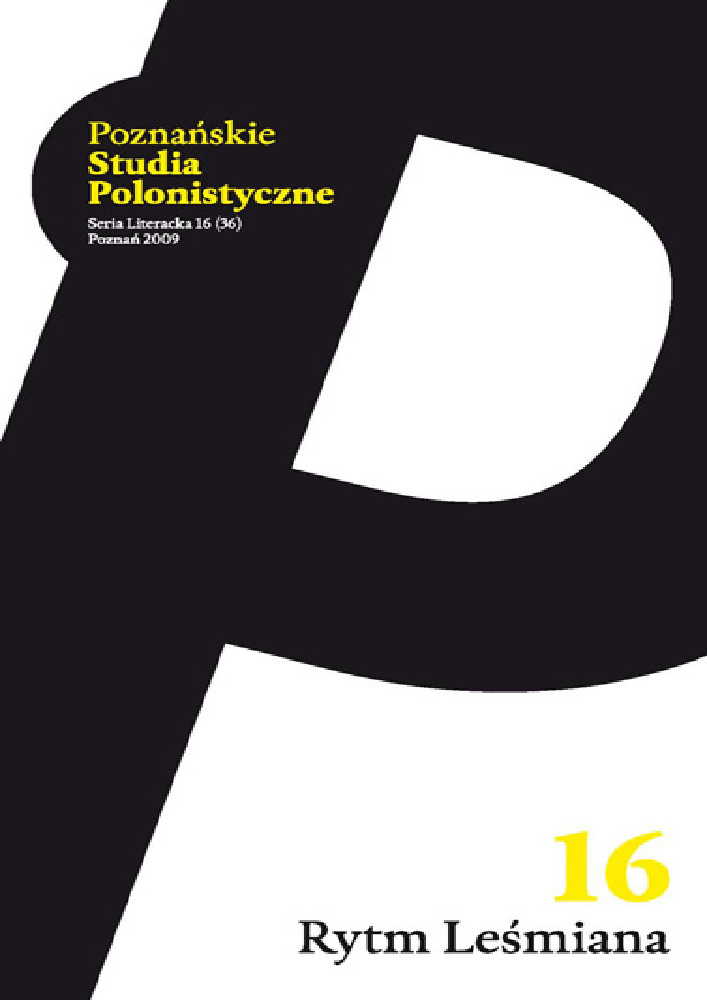Abstract
In the early decades of the twentieth century the misogynist philosophical conceptions proposed by Schopenhauer, Nietzsche and Weininger exerted a particular influence upon the image of woman. In the literary output of Leśmian this phenomenon takes on the form decidedly divergent from the patterns prevalent at the time manifesting in the typical features of archetypal and mythical figures. In the construction of his literary lovers, Leśmian makes references to ritual symbolism. His almost hieratic female figures, notionally available to woman, guide the way in a possible passage between the beyond (spiritual world) and the world of mortals. The poet accentuates the analogies between the sacredness of woman and the sacrum of Tellus Mater and adopts the at- titude of a neophyte who endows women with the power of initiation into the mystery of regeneration. The notional female figures created by Leśmian, with the typical for the poet positive and exhilarating valorization of woman’s body, have the power of euphemising thanatical fears and anxiety. Leśmian treats the corporeal nature of woman as hierophany: a female, revealing the sacral character of the universe, forms and contributes to its spiritual order. Schopenhauer, Nietzsche and Weininger demythologize the phenomenon of femininity, Leśmian remythologizes it back again.
References
Białczyński C., Stworze i zdusze, czyli starosłowiańskie boginki i demony, Kraków 1993.
Buchowski M., Magia i rytuał, Warszawa 1993.
Deutsch H., The Psychology of Women, New York 1944.
Durand G., Les structures anthropologiques de l’imaginaire, Paris 1992.
Eliade M., Historia wierzeń i idei religijnych, t. 1, przeł. S. Tokarski, Warszawa 1988.
Eliade M., Traktat o historii religii, przeł. J. Wierusz-Kowalski, Łódź 1993.
Gutowski W., Nagie dusze i maski. O młodopolskich mitach miłości, Kraków 1997.
Haeffner G., Wprowadzenie do antropologii filozoficznej, przeł. W. Szymona, Kraków 2006.
Kowalska J., Taniec drzewa życia. Uniwersalia kulturowe w tańcu, Warszawa 1991.
Kowalski P., Znaki świata. Omen, przesąd, znaczenie, Warszawa–Wrocław 1998.
Leeuw G. van der, Fenomenologia religii, przeł. J. Prokopiuk, Warszawa 1978.
Leśmian B., Dżananda, w: idem, Poezje wybrane, oprac. J. Trznadel, Wrocław 1983.
Leśmian B., Klechdy polskie, Kraków 1999.
Leśmian B., Poezje zebrane, red. A. Madyda, Toruń 1995.
Leśmian B., Skrzypek opętany, oprac. R.H. Stone, Warszawa 1985.
Leśmian B., Zdziczenie obyczajów pośmiertnych, oprac. J. Trznadel, Kraków 1998.
K., Kultura ludowa Słowian, t. 2, Warszawa 1967.
Nietzsche F., Ludzkie, arcyludzkie, przeł. K. Drzewiecki, Warszawa 1908.
Nietzsche F., Poza dobrem i złem, przeł. S. Wyrzykowski, Warszawa 1907.
Nietzsche F., Tako rzecze Zaratustra, przeł. W. Berent [brak informacji o miejscu i dacie wydania].
Nietzsche F., Wiedza radosna, przeł. L. Staff, Warszawa 1910-1911.
Nietzsche F., Zmierzch bożyszcz, przeł. S. Wyrzykowski, Warszawa 1909-1910.
Pełka L., Polska demonologia ludowa, Warszawa 1987.
Schopenhauer A., O kobietach, przeł. M. Uliński, „Principia” 1992, nr V.
Schopenhauer A., O podstawie moralności, przeł. Z. Bossakówna, Warszawa 1988.
Schopenhauer A., Psychologia miłości, przeł. A.L., Warszawa 1901.
Schopenhauer A., Świat jako wola i przedstawienie, przeł. J. Garewicz, t. 2, Warszawa 1995.
Stern A., Powroty Bolesława Leśmiana, w: Wspomnienia o Bolesławie Leśmianie, red. Z. Jastrzębski, Lublin 1966, s. 337.
Sokół L., Metafizyka płci: Strindberg, Weininger, Witkacy, „Pamiętnik Literacki” 1985, z. 4.
Uliński M., Kobieta i mężczyzna. Dzieje refleksji filozoficzno-społecznej, Kraków 2001.
Weininger O., Płeć i charakter. Rozbiór zasadniczy, przeł. O. Ortwin, Łódź 1921.
License
Authors
Authors of texts accepted for publication in „Poznańskie Studia Polonistyczne. Seria Literacka” are required to complete, sign and return to the editor's office the Agreement for granting a royalty-free license to works with a commitment to grant a CC sub-license.
Under the agreement, the authors of texts published in „Poznańskie Studia Polonistyczne. Seria Literacka” grant the Adam Mickiewicz University in Poznań a non-exclusive, royalty-free license and authorize the use of Attribution-NoDerivatives 4.0 International (CC BY-ND 4.0)Creative Commons sub-license.
The authors retain the right to continue the free disposal of the work.
Users
Interested Internet users are entitled to use works published in „Poznańskie Studia Polonistyczne. Seria Literacka” since 2016, for non-commercial purposes only, under the following conditions:
- attribution - obligation to provide, together with the distributed work, information about the authorship, title, source (link to the original work, DOI) and the license itself.
- no derivatives - the work must be preserved in its original form, without the author's consent it is not possible to distribute the modified work, such as translations, publications, etc.
Copyrights are reserved for all texts published before 2016.
Miscellaneous
Adam Mickiewicz University in Poznań retains the right to magazines as a whole (layout, graphic form, title, cover design, logo etc.).
